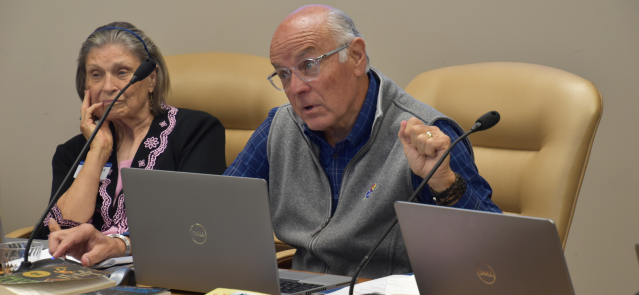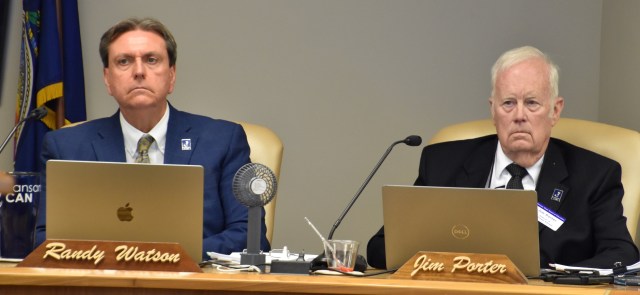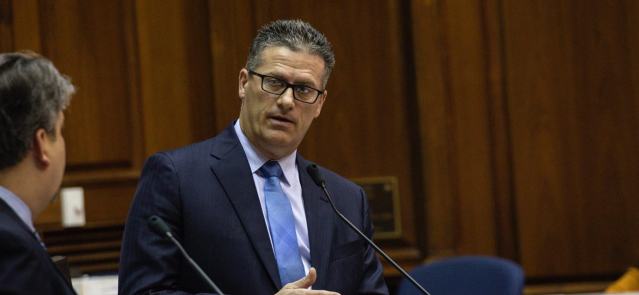Stay ahead of the curve as a political insider with deep policy analysis, daily briefings and policy-shaping tools.
Request a DemoA refresher on a some other ballot measures
Voters will be asked to weigh in on many contentious issues this November – including but not limited to: abortion, the border, tipped worker pay and sex trafficking – but three propositions will ask Arizonans if they want to make significant changes to the state’s elections process. The 2024 general election ballot will have 14 propositions, six more than voters saw in 2022. Make Elections Fair Act – a citizen-led bipartisan initiative that submitted over 584,000 signatures in their qualifying petition – looks to establish open primaries. If approved by voters, candidates would appear in one list on one ballot, rather than the current elections process, which sends out separate ballots to registered Democrats and Republicans. The initiative’s campaign garnered bipartisan support, but the Republican Party of Arizona opposed the proposition. Highground Public Affairs CEO Chuck Coughlin said the proposal would make general elections more competitive while throwing out partisan control in primary elections. On top of that, voters are being asked by Prop 137 (SCR1044 – judicial retention elections) whether they should scrap their own power to vote on judicial retention. If passed, the GOP-backed proposition would scrap retention votes for judges unless they are convicted of a felony or fraud crime, initiate bankruptcy, foreclose their mortgage or fail to meet judicial performance standards. Prop. 133 (HCR2033 – primary elections; eligible candidates), a ballot referral that passed out of the legislature in 2023, would ban any election law in the state that runs afoul of the Arizona Constitution and ban ranked choice voting.
Reproductive rights group challenges summary for ballot initiative
Corp Comm candidate explains why he’s using private money
Lawmakers push back against judging the judges ballot measure
Ballot manual challenged again for upcoming election
State ed board scraps recently implemented FAFSA requirement
The Kansas State Board of Education backtracked on a new graduation requirement it recently implemented for the upcoming school year.
Board members voted 6-3 on Wednesday to start the process of repealing an accreditation provision mandating that high school students complete the Free Application for Federal Student Aid. Board member Dennis Hershberger was not present for the vote.
Completion of the optional FAFSA application paves the way for students to receive federal funding for higher education expenses. According to data compiled by FAFSA Tracker, Kansas ranks in the bottom tier of FAFSA completion rates at 38.8%, while Tennessee leads the pack at 63.4%. Completion of the application by high school upperclassmen in Kansas, according to the data, has dropped by roughly 3,000 from the previous year.
State education leaders and legislators contend that millions of dollars in aid is being left on the table by students unaware of FAFSA’s potential financial benefits.
Danny Zeck, who represents an area of northeast Kansas, said the burden should be on the student and not the school because kids and parents are “supposed to try to figure out things themselves.”
“It seems like we want to do everything for everybody,” Zeck said, further explaining he’s “old school” in his views. “If you want to be successful, then you get out there and do whatever it takes to be successful.”
Zeck and Michelle Dombrosky were the only board members to cast “no” votes to the graduation overhaul measure in May.
The board in May voted to approve the new set of graduation requirements, marking the first time in 20 years the state overhauled those regulations. But at least two board members expressed skepticism over the FAFSA requirement, prompting the board to quickly revisit the measure.
Concern centered on alleged pushback from unnamed school administrators who didn’t believe getting students and parents to comply with the requirement was feasible — despite a built-in opt-out provision. But Education Commissioner Randy Watson countered the assertion, saying superintendents surveyed statewide broadly supported the measure.
At Wednesday’s meeting, the board considered but ultimately passed on an option that would have allowed districts to merely relay information related to FAFSA’s potential benefits and additional guidance from the Kansas State Department of Education. In that scenario, the measure would have no longer been considered an accreditation requirement.
The FAFSA requirement was included in recommendations from a task force’s multiyear study that looked into the graduation requirements overhaul. Board members were previously informed that the idea was to place the burden on the school district to do more as far as presenting FAFSA info to students.
Board member Cathy Hopkins, who represents a large swath of central and western Kansas, said Wednesday she believed the district “compliance” option presented during the meeting achieved that objective.
“I believe doing it through compliance does that,” Hopkins said. “And not through actual graduation requirements, which does put the burden on the parent or student to have to opt out and deal with the whole situation.”
Board member Jim Porter, who represents parts of southeast Kansas, said his concern primarily centered on “capable” students who were not being provided with pertinent info related to FAFSA. Some school districts hold annual FAFSA informational events, which is another avenue for schools to comply with the alternative option presented at the meeting. Porter said he believed the compliance option presented at Wednesday’s meeting would not result in a breakthrough.
“If compliance is a ‘FAFSA night’ and sending messages, it’s going to get to the same people it’s getting to now,” he said.
Board Chair Melanie Haas agreed that “a FAFSA night is not enough” as far as outreach efforts.
“It’s one night and a lot of parents are working, they’re busy, they can’t make it, they’ve got other kids,” she said.
Haas also mentioned that completion of the FAFSA does not automatically equate to higher education success.
“That’s what I want to solve,” Haas said. “If they’re going to go to college, it would be great to see them finish college.”
Board member Jim McNiece, who served as the chair of the graduation task force, was baffled by “all the fuss” related to the board’s swift pivot on the issue.
“I’ve talked to several people [on the graduation task force] and they were surprised,” McNiece said. “That’s what the board picked on? That’s the item that got the most attention?”
He said the measure specifically provides added support for all students, particularly those at risk. McNiece indicated the measure should be a slam dunk, noting that the board wasn’t scaling “Mount Everest.”
Matt Resnick is a Statehouse reporter at State Affairs Pro Kansas/Hawver’s Capitol Report. Reach him at [email protected].
KBI reports violent crime down 3.7%, property crime up 2.6%
Violent crimes were down 3.7% in 2023, but property crimes increased for the first time since 2017, the Kansas Bureau of Investigation reported Wednesday.
The bureau released its annual Crime Index, which compiles statistics from local and state law enforcement agencies.
Kansas had 13,294 violent crimes, a category that includes murder, rape, robbery, and aggravated assault and battery. Each crime had a decline in total incidents:
- Murder: 157 from 168 (6.5% decline); 152 (10-year average)
- Rape: 1,120 from 1,281 (12.6% decline); 1,192 (10-year average)
- Robbery: 1,097 from 1,104 (0.6% decline); 1,415 (10-year average)
- Aggravated assault/battery: 10,920 from 11,255 (3% decline); 9,479 (10-year average)
Last July, the bureau’s report showed a 4.3% decline in violent crimes in 2022 before an amended document in November revealed a 2.9% increase after an initial reporting error with the Wichita Police Department’s data.
Overall, the violent crime rate per 1,000 people dropped to 4.5 in 2023 from 4.7 in 2022.
Violent crime remained 8.6% above the 10-year average of 12,239 offenses.
Law enforcement agencies reported 66,782 property crimes, an increase of 2.6% from 2022. Property crimes include burglary, theft and motor vehicle theft.
Burglary dropped by 1.1% to 8,748 incidents in 2023 from 8,849 in 2022, but theft increased by 2.9% to 49,754 from 48,373, and motor vehicle theft went up 4.8% to 8,280 from 7,897.
Overall, the property crime rate per 1,000 people rose to 22.5 in 2023 from 22 in 2022.
But total property crimes sat 10% below the 10-year average of 74,228 offenses. The 2023 property crime totals were below the 10-year average for burglary (11,942), theft (54,391) and motor vehicle theft (7,896).
“It is often not possible to draw further interpretations or conclusions from the data,” the bureau said in a news release.
Bryan Richardson is the managing editor at State Affairs Pro Kansas/Hawver’s Capitol Report. Reach him at [email protected] or on X @RichInNews.
State Board of Education discusses cell phones, screen time in schools
As some states begin to ban cell phones in schools, the Kansas State Board of Education is weighing how best to address students’ screen time.
The board on Tuesday heard a presentation from Payton Lynn, an intern with the Kansas State Department of Education. The project was overseen by Jake Steel, the department’s director of strategy and operational alignment; and Gabrielle Hull, legislative coordinator for the department’s Division of Fiscal and Administrative Services.
Lynn pointed to legislative action around the country, including phone bans in Florida, South Carolina and Indiana and new policies and guidance in other states. Just this week, Virginia Gov. Glenn Youngkin signed an executive order to create cell phone-free classrooms by Jan. 1.
In Kansas, House Bill 2641 died in committee earlier this year. The bill would’ve required each Kansas school board to create a policy banning personal cell phones during normal school hours, with certain exceptions.
Shannon Kimball of the Kansas Association of School Boards said during a February hearing that she believed phone restrictions are issues best addressed locally. The Kansas National Education Association also opposed the bill for the same reason.
Steel called the issue a hot-button topic and said the research was specifically focused on the non-educational time students spend on screens, from watches to tablets to phones to computers.
Education Commissioner Randy Watson said the word “cell phone” is a misnomer because most smartphone usage isn’t simply making a call.
“These devices aren’t being used to call your friend or call home,” he said.
Since 2020, children’s non-educational screen time has risen by 52% to an average of seven to 10 hours per day, Lynn said. About five of those hours are spent on social media.
But she said there’s not much expert guidance on how much time school-aged children should spend in front of screens.
Studies show high amounts of screen time are correlated with higher levels of depression and anxiety, though Lynn said it’s unclear whether that relationship is causal. Some research also shows that certain types of screen time, such as educational TV programming, can be beneficial.
Lynn cited a report from the U.S. surgeon general, Dr. Vivek Murthy, that found “adolescents who spend more than three hours per day on social media face double the risk of experiencing poor mental health outcomes.”
Studies show that 77% of schools nationwide have policies against non-academic cell phone use — though Lynn explained that many of those policies were written in the early 2000s and are now outdated.
Difficulties today include inconsistent enforcement of those policies, leaving individual teachers to police their own classrooms.
“A lot of educators say that it’s really difficult to enforce this at the classroom level. …” Lynn said. “Others would say that it’s really important for the administration to be the ones to enforce it so that teachers don’t have to take the time to be the cell phone police in class.”
However, surveys show parents generally don’t want their children’s phones to be unavailable during class.
Board member Betty Arnold said she understands that parents are divided and that some want their children to have the ability to communicate during emergencies.
“I don’t think that we can bring everybody together on that same page for that,” Arnold said.
Ann Mah, another board member, suggested a state-level ban on phones in schools would be unenforceable and said it’s an issue that should be handled at the local level.
Brett Stover is a Statehouse reporter at State Affairs Pro Kansas/Hawver’s Capitol Report. Reach him at [email protected] or on X @BrettStoverKS.
Ex-Rep. Eberhart gets prison time in casino conspiracy
Former state Rep. Sean Eberhart was sentenced Wednesday to 12 months and one day in prison after pleading guilty to federal felony charges of influencing casino legislation in return for the promise of a $350,000-a-year job.
A judge ordered the sentence after Eberhart apologized in court for his actions during the 2019 legislative session and said he was ready to accept whatever punishment the judge imposed.
“I am truly, deeply sorry for what I did,” Eberhart said as he spoke for about two minutes near the end of an hourlong sentencing hearing.
No one else has been charged in connection with Eberhart’s conspiracy case, and the court hearing gave no indications of any forthcoming charges against executives of Indianapolis-based Spectacle Entertainment or others.
Eberhart’s plea agreement and sentencing orders included no mention of him cooperating with investigators or requirement of testifying against others.
Bradley Shepard, senior litigation counsel for the U.S. Attorney’s Office in Indianapolis, declined to comment after the hearing on Eberhart’s level of cooperation or whether the investigation was ongoing.
Prosecutor: ‘An assault on the public trust’
U.S. District Court Judge Matthew Brookman allowed Eberhart to remain free until the Federal Bureau of Prisons sets a surrender date.
Eberhart, 58, was also ordered to pay a $25,000 fine and spend one year on supervised release for illegally working on behalf of Spectacle Entertainment while a broad gambling expansion bill advanced through the Legislature.
He also must pay $60,000 in restitution to the State Budget Agency — an amount similar to his annual salary as a legislator.
Brookman told Eberhart that the extra day beyond one year for the prison sentence made him eligible for good time credit toward early release.
Eberhart, a Republican from Shelbyville, was an Indiana House member for the 57th District from 2006 until he didn’t seek reelection in 2022.
He pleaded guilty in November to a felony charge of conspiracy to commit honest services fraud, with a maximum sentence of five years in prison.
Shepard asked the judge to sentence Eberhart to a year in prison or at least the 10-month sentence that former state Sen. Brent Waltz received in 2022 for scheming with a former Spectacle executive to illegally funnel casino company money to Waltz’s unsuccessful 2016 congressional campaign.
Shepard called Eberhart’s actions “an assault on the public trust.”
Shepard pointed to Eberhart working on behalf of Spectacle in seeking legislative provisions potentially saving the company tens of millions of dollars in its plans to move Gary’s twin lakefront casinos to more lucrative inland locations in Gary and Terre Haute.
Defense: Eberhart imposed ‘horrible sentence’ upon himself
Eberhart’s defense attorney, Patrick Cotter of Chicago, argued Eberhart never received any money from Spectacle and had no other instances of wrongdoing during 24 years in elected county and state offices.
Cotter said he believed federal prosecutors were wrongly using Eberhart as a “symbol” to send an anti-corruption message in a case that drew news media attention.
Cotter said sending Eberhart to prison wouldn’t lead to greater deterrence of future public corruption and that Eberhart’s actions had destroyed his reputation.
“It is a horrible sentence he has imposed upon himself,” Cotter said.
Eberhart didn’t respond to a question from State Affairs as he left the courtroom, and Cotter said they would have no further comment.
Judge said Eberhart committed crime ‘out of greed’
Brookman said federal guidelines called for tougher sentencing of public officials, while Eberhart’s sentence was mitigated by him not having any previous criminal charges and “clearly accepting” responsibility in this case.
Brookman told Eberhart that he had gained a position of public trust but that he “threw that away” by committing a crime “out of greed.”
“You stood to make a lot of money from the deal you cut,” Brookman said. “What makes the fraud, the theft, so serious is that it involves an elected official.”
Other fallout from Spectacle investigations
Eberhart’s district included what is now the Horseshoe Indianapolis horse track and casino near Shelbyville. He frequently sponsored casino-related legislation, including a multiyear push to allow live table games such as blackjack at Indiana’s two horse track casinos.
The wide-ranging 2019 measure also allowed a new casino in Terre Haute, along with reducing the Gary casino transfer fee from an earlier proposed $100 million to $20 million and enacting tax incentives that would have benefitted Spectacle. Other provisions allowed live table games at the horse track casinos and the start of sports betting in the state.
The charges against Eberhart followed the federal sentencings of Waltz and Spectacle Entertainment executive John Keeler in the campaign finance case.
Those charges led the Indiana Gaming Commission to force Spectacle and longtime Indiana casino heavyweight Rod Ratcliff to give up ownership of the Gary and Terre Haute casino projects.
Update: This story has been updated to include comment from Eberhart and other details on the case.
Tom Davies is a Statehouse reporter for State Affairs Pro Indiana. Reach him at [email protected] or on X at @TomDaviesIND.




